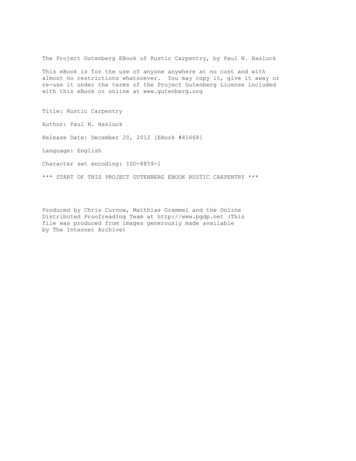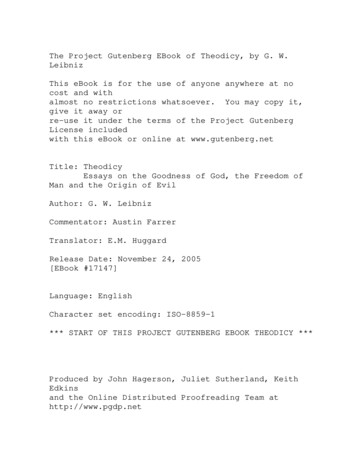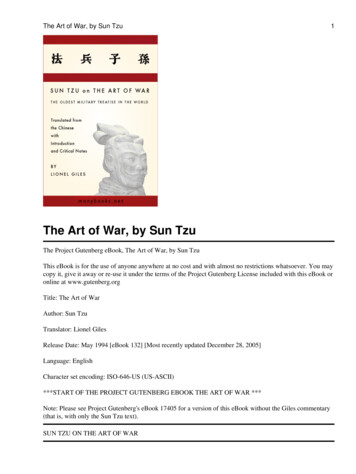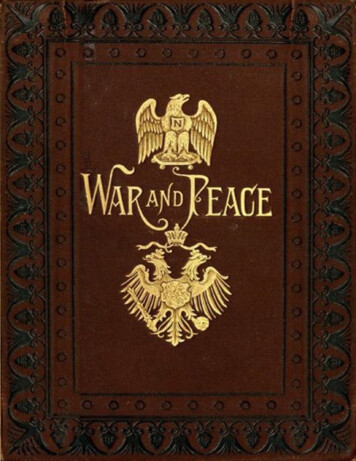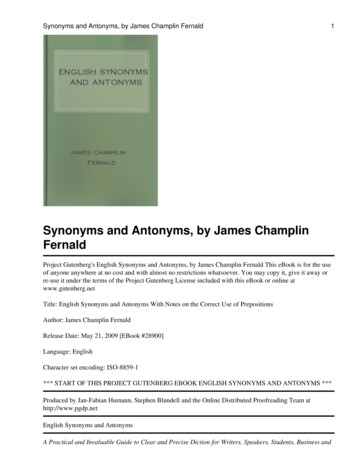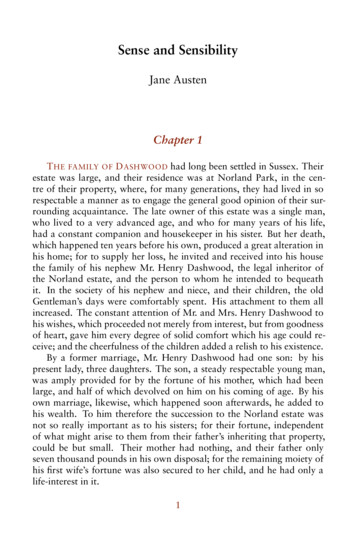
Transcription
Sense and SensibilityJane AustenChapter 1T HE FAMILY OF D ASHWOOD had long been settled in Sussex. Theirestate was large, and their residence was at Norland Park, in the centre of their property, where, for many generations, they had lived in sorespectable a manner as to engage the general good opinion of their surrounding acquaintance. The late owner of this estate was a single man,who lived to a very advanced age, and who for many years of his life,had a constant companion and housekeeper in his sister. But her death,which happened ten years before his own, produced a great alteration inhis home; for to supply her loss, he invited and received into his housethe family of his nephew Mr. Henry Dashwood, the legal inheritor ofthe Norland estate, and the person to whom he intended to bequeathit. In the society of his nephew and niece, and their children, the oldGentleman’s days were comfortably spent. His attachment to them allincreased. The constant attention of Mr. and Mrs. Henry Dashwood tohis wishes, which proceeded not merely from interest, but from goodnessof heart, gave him every degree of solid comfort which his age could receive; and the cheerfulness of the children added a relish to his existence.By a former marriage, Mr. Henry Dashwood had one son: by hispresent lady, three daughters. The son, a steady respectable young man,was amply provided for by the fortune of his mother, which had beenlarge, and half of which devolved on him on his coming of age. By hisown marriage, likewise, which happened soon afterwards, he added tohis wealth. To him therefore the succession to the Norland estate wasnot so really important as to his sisters; for their fortune, independentof what might arise to them from their father’s inheriting that property,could be but small. Their mother had nothing, and their father onlyseven thousand pounds in his own disposal; for the remaining moiety ofhis first wife’s fortune was also secured to her child, and he had only alife-interest in it.1
SENSE AND SENSIBILITYThe old gentleman died: his will was read, and like almost everyother will, gave as much disappointment as pleasure. He was neither sounjust, nor so ungrateful, as to leave his estate from his nephew;—but heleft it to him on such terms as destroyed half the value of the bequest. Mr.Dashwood had wished for it more for the sake of his wife and daughtersthan for himself or his son;—but to his son, and his son’s son, a childof four years old, it was secured, in such a way, as to leave to himselfno power of providing for those who were most dear to him, and whomost needed a provision by any charge on the estate, or by any sale ofits valuable woods. The whole was tied up for the benefit of this child,who, in occasional visits with his father and mother at Norland, had sofar gained on the affections of his uncle, by such attractions as are by nomeans unusual in children of two or three years old; an imperfect articulation, an earnest desire of having his own way, many cunning tricks,and a great deal of noise, as to outweigh all the value of all the attentionwhich, for years, he had received from his niece and her daughters. Hemeant not to be unkind, however, and, as a mark of his affection for thethree girls, he left them a thousand pounds a-piece.Mr. Dashwood’s disappointment was, at first, severe; but his temperwas cheerful and sanguine; and he might reasonably hope to live manyyears, and by living economically, lay by a considerable sum from theproduce of an estate already large, and capable of almost immediateimprovement. But the fortune, which had been so tardy in coming, washis only one twelvemonth. He survived his uncle no longer; and tenthousand pounds, including the late legacies, was all that remained forhis widow and daughters.His son was sent for as soon as his danger was known, and to himMr. Dashwood recommended, with all the strength and urgency whichillness could command, the interest of his mother-in-law and sisters.Mr. John Dashwood had not the strong feelings of the rest of thefamily; but he was affected by a recommendation of such a nature atsuch a time, and he promised to do every thing in his power to makethem comfortable. His father was rendered easy by such an assurance,and Mr. John Dashwood had then leisure to consider how much theremight prudently be in his power to do for them.He was not an ill-disposed young man, unless to be rather coldhearted and rather selfish is to be ill-disposed: but he was, in general,well respected; for he conducted himself with propriety in the dischargeof his ordinary duties. Had he married a more amiable woman, he might2
JANE AUSTENhave been made still more respectable than he was:—he might even havebeen made amiable himself; for he was very young when he married, andvery fond of his wife. But Mrs. John Dashwood was a strong caricatureof himself;—more narrow-minded and selfish.When he gave his promise to his father, he meditated within himselfto increase the fortunes of his sisters by the present of a thousand poundsa-piece. He then really thought himself equal to it. The prospect of fourthousand a-year, in addition to his present income, besides the remaining half of his own mother’s fortune, warmed his heart, and made himfeel capable of generosity.—“Yes, he would give them three thousandpounds: it would be liberal and handsome! It would be enough to makethem completely easy. Three thousand pounds! he could spare so considerable a sum with little inconvenience.”—He thought of it all day long,and for many days successively, and he did not repent.No sooner was his father’s funeral over, than Mrs. John Dashwood,without sending any notice of her intention to her mother-in-law, arrivedwith her child and their attendants. No one could dispute her right tocome; the house was her husband’s from the moment of his father’s decease; but the indelicacy of her conduct was so much the greater, andto a woman in Mrs. Dashwood’s situation, with only common feelings,must have been highly unpleasing;—but in her mind there was a senseof honor so keen, a generosity so romantic, that any offence of the kind,by whomsoever given or received, was to her a source of immoveabledisgust. Mrs. John Dashwood had never been a favourite with any ofher husband’s family; but she had had no opportunity, till the present, ofshewing them with how little attention to the comfort of other peopleshe could act when occasion required it.So acutely did Mrs. Dashwood feel this ungracious behaviour, and soearnestly did she despise her daughter-in-law for it, that, on the arrival ofthe latter, she would have quitted the house for ever, had not the entreatyof her eldest girl induced her first to reflect on the propriety of going, andher own tender love for all her three children determined her afterwardsto stay, and for their sakes avoid a breach with their brother.Elinor, this eldest daughter, whose advice was so effectual, possesseda strength of understanding, and coolness of judgment, which qualifiedher, though only nineteen, to be the counsellor of her mother, and enabled her frequently to counteract, to the advantage of them all, thateagerness of mind in Mrs. Dashwood which must generally have led toimprudence. She had an excellent heart;—her disposition was affection3
SENSE AND SENSIBILITYate, and her feelings were strong; but she knew how to govern them: itwas a knowledge which her mother had yet to learn; and which one ofher sisters had resolved never to be taught.Marianne’s abilities were, in many respects, quite equal to Elinor’s.She was sensible and clever; but eager in everything: her sorrows, herjoys, could have no moderation. She was generous, amiable, interesting:she was everything but prudent. The resemblance between her and hermother was strikingly great.Elinor saw, with concern, the excess of her sister’s sensibility; butby Mrs. Dashwood it was valued and cherished. They encouraged eachother now in the violence of their affliction. The agony of grief whichoverpowered them at first, was voluntarily renewed, was sought for, wascreated again and again. They gave themselves up wholly to their sorrow,seeking increase of wretchedness in every reflection that could afford it,and resolved against ever admitting consolation in future. Elinor, too,was deeply afflicted; but still she could struggle, she could exert herself.She could consult with her brother, could receive her sister-in-law on herarrival, and treat her with proper attention; and could strive to rouse hermother to similar exertion, and encourage her to similar forbearance.Margaret, the other sister, was a good-humored, well-disposed girl;but as she had already imbibed a good deal of Marianne’s romance, without having much of her sense, she did not, at thirteen, bid fair to equalher sisters at a more advanced period of life.Chapter 2M RS . J OHN D ASHWOOD now installed herself mistress of Norland;and her mother and sisters-in-law were degraded to the condition ofvisitors. As such, however, they were treated by her with quiet civility;and by her husband with as much kindness as he could feel towardsanybody beyond himself, his wife, and their child. He really pressedthem, with some earnestness, to consider Norland as their home; and, asno plan appeared so eligible to Mrs. Dashwood as remaining there tillshe could accommodate herself with a house in the neighbourhood, hisinvitation was accepted.A continuance in a place where everything reminded her of formerdelight, was exactly what suited her mind. In seasons of cheerfulness, notemper could be more cheerful than hers, or possess, in a greater degree,4
JANE AUSTENthat sanguine expectation of happiness which is happiness itself. But insorrow she must be equally carried away by her fancy, and as far beyondconsolation as in pleasure she was beyond alloy.Mrs. John Dashwood did not at all approve of what her husbandintended to do for his sisters. To take three thousand pounds from thefortune of their dear little boy would be impoverishing him to the mostdreadful degree. She begged him to think again on the subject. Howcould he answer it to himself to rob his child, and his only child too, ofso large a sum? And what possible claim could the Miss Dashwoods,who were related to him only by half blood, which she considered as norelationship at all, have on his generosity to so large an amount. It wasvery well known that no affection was ever supposed to exist betweenthe children of any man by different marriages; and why was he to ruinhimself, and their poor little Harry, by giving away all his money to hishalf sisters?“It was my father’s last request to me,” replied her husband, “that Ishould assist his widow and daughters.”“He did not know what he was talking of, I dare say; ten to one buthe was light-headed at the time. Had he been in his right senses, he couldnot have thought of such a thing as begging you to give away half yourfortune from your own child.”“He did not stipulate for any particular sum, my dear Fanny; he onlyrequested me, in general terms, to assist them, and make their situationmore comfortable than it was in his power to do. Perhaps it would havebeen as well if he had left it wholly to myself. He could hardly supposeI should neglect them. But as he required the promise, I could not doless than give it; at least I thought so at the time. The promise, therefore,was given, and must be performed. Something must be done for themwhenever they leave Norland and settle in a new home.”“Well, then, let something be done for them; but that something neednot be three thousand pounds. Consider,” she added, “that when themoney is once parted with, it never can return. Your sisters will marry,and it will be gone for ever. If, indeed, it could be restored to our poorlittle boy—”“Why, to be sure,” said her husband, very gravely, “that would makegreat difference. The time may come when Harry will regret that so largea sum was parted with. If he should have a numerous family, for instance,it would be a very convenient addition.”“To be sure it would.”5
SENSE AND SENSIBILITY“Perhaps, then, it would be better for all parties, if the sum werediminished one half.—Five hundred pounds would be a prodigious increase to their fortunes!”“Oh! beyond anything great! What brother on earth would do halfso much for his sisters, even if really his sisters! And as it is—only halfblood!—But you have such a generous spirit!”“I would not wish to do any thing mean,” he replied. “One hadrather, on such occasions, do too much than too little. No one, at least,can think I have not done enough for them: even themselves, they canhardly expect more.”“There is no knowing what they may expect,” said the lady, “butwe are not to think of their expectations: the question is, what you canafford to do.”“Certainly—and I think I may afford to give them five hundredpounds a-piece. As it is, without any addition of mine, they will eachhave about three thousand pounds on their mother’s death—a very comfortable fortune for any young woman.”“To be sure it is; and, indeed, it strikes me that they can want noaddition at all. They will have ten thousand pounds divided amongstthem. If they marry, they will be sure of doing well, and if they donot, they may all live very comfortably together on the interest of tenthousand pounds.”“That is very true, and, therefore, I do not know whether, upon thewhole, it would not be more advisable to do something for their motherwhile she lives, rather than for them—something of the annuity kind Imean.—My sisters would feel the good effects of it as well as herself. Ahundred a year would make them all perfectly comfortable.”His wife hesitated a little, however, in giving her consent to this plan.“To be sure,” said she, “it is better than parting with fifteen hundredpounds at once. But, then, if Mrs. Dashwood should live fifteen yearswe shall be completely taken in.”“Fifteen years! my dear Fanny; her life cannot be worth half thatpurchase.”“Certainly not; but if you observe, people always live for ever whenthere is an annuity to be paid them; and she is very stout and healthy,and hardly forty. An annuity is a very serious business; it comes overand over every year, and there is no getting rid of it. You are not awareof what you are doing. I have known a great deal of the trouble of annuities; for my mother was clogged with the payment of three to old6
JANE AUSTENsuperannuated servants by my father’s will, and it is amazing how disagreeable she found it. Twice every year these annuities were to be paid;and then there was the trouble of getting it to them; and then one ofthem was said to have died, and afterwards it turned out to be no suchthing. My mother was quite sick of it. Her income was not her own,she said, with such perpetual claims on it; and it was the more unkindin my father, because, otherwise, the money would have been entirely atmy mother’s disposal, without any restriction whatever. It has given mesuch an abhorrence of annuities, that I am sure I would not pin myselfdown to the payment of one for all the world.”“It is certainly an unpleasant thing,” replied Mr. Dashwood, “to havethose kind of yearly drains on one’s income. One’s fortune, as yourmother justly says, is not one’s own. To be tied down to the regularpayment of such a sum, on every rent day, is by no means desirable: ittakes away one’s independence.”“Undoubtedly; and after all you have no thanks for it. They thinkthemselves secure, you do no more than what is expected, and it raisesno gratitude at all. If I were you, whatever I did should be done at myown discretion entirely. I would not bind myself to allow them any thingyearly. It may be very inconvenient some years to spare a hundred, oreven fifty pounds from our own expenses.”“I believe you are right, my love; it will be better that there should byno annuity in the case; whatever I may give them occasionally will be offar greater assistance than a yearly allowance, because they would onlyenlarge their style of living if they felt sure of a larger income, and wouldnot be sixpence the richer for it at the end of the year. It will certainlybe much the best way. A present of fifty pounds, now and then, willprevent their ever being distressed for money, and will, I think, be amplydischarging my promise to my father.”“To be sure it will. Indeed, to say the truth, I am convinced withinmyself that your father had no idea of your giving them any money atall. The assistance he thought of, I dare say, was only such as mightbe reasonably expected of you; for instance, such as looking out for acomfortable small house for them, helping them to move their things,and sending them presents of fish and game, and so forth, whenever theyare in season. I’ll lay my life that he meant nothing farther; indeed, itwould be very strange and unreasonable if he did. Do but consider, mydear Mr. Dashwood, how excessively comfortable your mother-in-lawand her daughters may live on the interest of seven thousand pounds,7
SENSE AND SENSIBILITYbesides the thousand pounds belonging to each of the girls, which bringsthem in fifty pounds a year a-piece, and, of course, they will pay theirmother for their board out of it. Altogether, they will have five hundreda-year amongst them, and what on earth can four women want for morethan that?—They will live so cheap! Their housekeeping will be nothingat all. They will have no carriage, no horses, and hardly any servants;they will keep no company, and can have no expenses of any kind! Onlyconceive how comfortable they will be! Five hundred a year! I am sureI cannot imagine how they will spend half of it; and as to your givingthem more, it is quite absurd to think of it. They will be much more ableto give you something.”“Upon my word,” said Mr. Dashwood, “I believe you are perfectlyright. My father certainly could mean nothing more by his request tome than what you say. I clearly understand it now, and I will strictlyfulfil my engagement by such acts of assistance and kindness to them asyou have described. When my mother removes into another house myservices shall be readily given to accommodate her as far as I can. Somelittle present of furniture too may be acceptable then.”“Certainly,” returned Mrs. John Dashwood. “But, however, onething must be considered. When your father and mother moved to Norland, though the furniture of Stanhill was sold, all the china, plate, andlinen was saved, and is now left to your mother. Her house will thereforebe almost completely fitted up as soon as she takes it.”“That is a material consideration undoubtedly. A valuable legacyindeed! And yet some of the plate would have been a very pleasantaddition to our own stock here.”“Yes; and the set of breakfast china is twice as handsome as whatbelongs to this house. A great deal too handsome, in my opinion, forany place they can ever afford to live in. But, however, so it is. Yourfather thought only of them. And I must say this: that you owe noparticular gratitude to him, nor attention to his wishes; for we very wellknow that if he could, he would have left almost everything in the worldto them.”This argument was irresistible. It gave to his intentions whateverof decision was wanting before; and he finally resolved, that it wouldbe absolutely unnecessary, if not highly indecorous, to do more for thewidow and children of his father, than such kind of neighbourly acts ashis own wife pointed out.8
JANE AUSTENChapter 3M RS . D ASHWOOD remained at Norland several months; not fromany disinclination to move when the sight of every well known spotceased to raise the violent emotion which it produced for a while; forwhen her spirits began to revive, and her mind became capable of someother exertion than that of heightening its affliction by melancholy remembrances, she was impatient to be gone, and indefatigable in her inquiries for a suitable dwelling in the neighbourhood of Norland; for toremove far from that beloved spot was impossible. But she could hearof no situation that at once answered her notions of comfort and ease,and suited the prudence of her eldest daughter, whose steadier judgmentrejected several houses as too large for their income, which her motherwould have approved.Mrs. Dashwood had been informed by her husband of the solemnpromise on the part of his son in their favour, which gave comfort tohis last earthly reflections. She doubted the sincerity of this assurance nomore than he had doubted it himself, and she thought of it for her daughters’ sake with satisfaction, though as for herself she was persuaded thata much smaller provision than 7000 would support her in affluence.For their brother’s sake, too, for the sake of his own heart, she rejoiced;and she reproached herself for being unjust to his merit before, in believing him incapable of generosity. His attentive behaviour to herself andhis sisters convinced her that their welfare was dear to him, and, for along time, she firmly relied on the liberality of his intentions.The contempt which she had, very early in their acquaintance, feltfor her daughter-in-law, was very much increased by the farther knowledge of her character, which half a year’s residence in her family afforded;and perhaps in spite of every consideration of politeness or maternal affection on the side of the former, the two ladies might have found itimpossible to have lived together so long, had not a particular circumstance occurred to give still greater eligibility, according to the opinionsof Mrs. Dashwood, to her daughters’ continuance at Norland.This circumstance was a growing attachment between her eldest girland the brother of Mrs. John Dashwood, a gentleman-like and pleasingyoung man, who was introduced to their acquaintance soon after hissister’s establishment at Norland, and who had since spent the greatestpart of his time there.Some mothers might have encouraged the intimacy from motives of9
SENSE AND SENSIBILITYinterest, for Edward Ferrars was the eldest son of a man who had diedvery rich; and some might have repressed it from motives of prudence,for, except a trifling sum, the whole of his fortune depended on the willof his mother. But Mrs. Dashwood was alike uninfluenced by eitherconsideration. It was enough for her that he appeared to be amiable,that he loved her daughter, and that Elinor returned the partiality. It wascontrary to every doctrine of her’s that difference of fortune should keepany couple asunder who were attracted by resemblance of disposition;and that Elinor’s merit should not be acknowledged by every one whoknew her, was to her comprehension impossible.Edward Ferrars was not recommended to their good opinion by anypeculiar graces of person or address. He was not handsome, and hismanners required intimacy to make them pleasing. He was too diffidentto do justice to himself; but when his natural shyness was overcome, hisbehaviour gave every indication of an open, affectionate heart. His understanding was good, and his education had given it solid improvement.But he was neither fitted by abilities nor disposition to answer the wishesof his mother and sister, who longed to see him distinguished—as—theyhardly knew what. They wanted him to make a fine figure in the worldin some manner or other. His mother wished to interest him in politicalconcerns, to get him into parliament, or to see him connected with someof the great men of the day. Mrs. John Dashwood wished it likewise; butin the mean while, till one of these superior blessings could be attained,it would have quieted her ambition to see him driving a barouche. ButEdward had no turn for great men or barouches. All his wishes centeredin domestic comfort and the quiet of private life. Fortunately he had ayounger brother who was more promising.Edward had been staying several weeks in the house before he engaged much of Mrs. Dashwood’s attention; for she was, at that time, insuch affliction as rendered her careless of surrounding objects. She sawonly that he was quiet and unobtrusive, and she liked him for it. He didnot disturb the wretchedness of her mind by ill-timed conversation. Shewas first called to observe and approve him farther, by a reflection whichElinor chanced one day to make on the difference between him and hissister. It was a contrast which recommended him most forcibly to hermother.“It is enough,” said she; “to say that he is unlike Fanny is enough. Itimplies everything amiable. I love him already.”“I think you will like him,” said Elinor, “when you know more of10
JANE AUSTENhim.”“Like him!” replied her mother with a smile. “I feel no sentiment ofapprobation inferior to love.”“You may esteem him.”“I have never yet known what it was to separate esteem and love.”Mrs. Dashwood now took pains to get acquainted with him. Hermanners were attaching, and soon banished his reserve. She speedilycomprehended all his merits; the persuasion of his regard for Elinor perhaps assisted her penetration; but she really felt assured of his worth:and even that quietness of manner, which militated against all her established ideas of what a young man’s address ought to be, was no longeruninteresting when she knew his heart to be warm and his temper affectionate.No sooner did she perceive any symptom of love in his behaviourto Elinor, than she considered their serious attachment as certain, andlooked forward to their marriage as rapidly approaching.“In a few months, my dear Marianne.” said she, “Elinor will, in allprobability be settled for life. We shall miss her; but she will be happy.”“Oh! Mamma, how shall we do without her?”“My love, it will be scarcely a separation. We shall live within afew miles of each other, and shall meet every day of our lives. You willgain a brother, a real, affectionate brother. I have the highest opinionin the world of Edward’s heart. But you look grave, Marianne; do youdisapprove your sister’s choice?”“Perhaps,” said Marianne, “I may consider it with some surprise.Edward is very amiable, and I love him tenderly. But yet—he is notthe kind of young man—there is something wanting—his figure is notstriking; it has none of that grace which I should expect in the man whocould seriously attach my sister. His eyes want all that spirit, that fire,which at once announce virtue and intelligence. And besides all this, Iam afraid, Mamma, he has no real taste. Music seems scarcely to attracthim, and though he admires Elinor’s drawings very much, it is not theadmiration of a person who can understand their worth. It is evident,in spite of his frequent attention to her while she draws, that in fact heknows nothing of the matter. He admires as a lover, not as a connoisseur.To satisfy me, those characters must be united. I could not be happywith a man whose taste did not in every point coincide with my own.He must enter into all my feelings; the same books, the same music mustcharm us both. Oh! mama, how spiritless, how tame was Edward’s11
SENSE AND SENSIBILITYmanner in reading to us last night! I felt for my sister most severely. Yetshe bore it with so much composure, she seemed scarcely to notice it.I could hardly keep my seat. To hear those beautiful lines which havefrequently almost driven me wild, pronounced with such impenetrablecalmness, such dreadful indifference!”—“He would certainly have done more justice to simple and elegantprose. I thought so at the time; but you would give him Cowper.”“Nay, Mamma, if he is not to be animated by Cowper!—but we mustallow for difference of taste. Elinor has not my feelings, and thereforeshe may overlook it, and be happy with him. But it would have brokemy heart, had I loved him, to hear him read with so little sensibility.Mama, the more I know of the world, the more am I convinced that Ishall never see a man whom I can really love. I require so much! He musthave all Edward’s virtues, and his person and manners must ornamenthis goodness with every possible charm.”“Remember, my love, that you are not seventeen. It is yet too earlyin life to despair of such a happiness. Why should you be less fortunatethan your mother? In one circumstance only, my Marianne, may yourdestiny be different from her’s!”Chapter 4“W HAT A PITY IT IS , E LINOR ,” said Marianne, “that Edwardshould have no taste for drawing.”“No taste for drawing!” replied Elinor, “why should you think so?He does not draw himself, indeed, but he has great pleasure in seeingthe performances of other people, and I assure you he is by no meansdeficient in natural taste, though he has not had opportunities of improving it. Had he ever been in the way of learning, I think he would havedrawn very well. He distrusts his own judgment in such matters so much,that he is always unwilling to give his opinion on any picture; but he hasan innate propriety and simplicity of taste, which in general direct himperfectly right.”Marianne was afraid of offending, and said no more on the subject;but the kind of approbation which Elinor described as excited in him bythe drawings of other people, was very far from that rapturous delight,which, in her opinion, could alone be called taste. Yet, though smilingwithin herself at the mistake, she honoured her sister for that blind par12
JANE AUSTENtiality to Edward which produced it.“I hope, Marianne,” continued Elinor, “you do not consider him asdeficient in general taste. Indeed, I think I may say that you cannot, foryour behaviour to him is perfectly cordial, and if that were your opinion,I am sure you could never be civil to him.”Marianne hardly knew what to say. She would not wound the feelings of her sister on any account, and yet to say what she did not believewas impossible. At length she replied:“Do not be offended, Elinor, if my praise of him is not in every thingequal to your sense of his merits. I have not had so many opportunitiesof estimating the minuter propensities of his mind, his inclinations andtastes, as you hav
tre of their property, where, for many generations, they had lived in so respectable a manner as to engage the general good opinion of their sur-rounding acquaintance. The late owner of this estate was a single man, who lived to a very advanced age, and who for many years of his life
